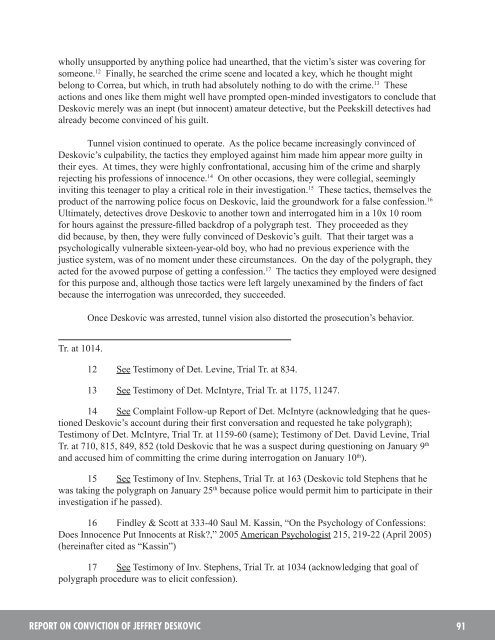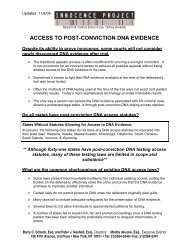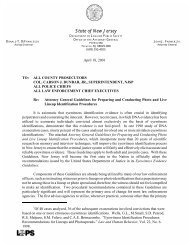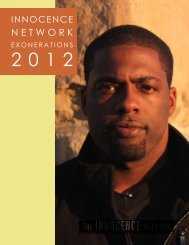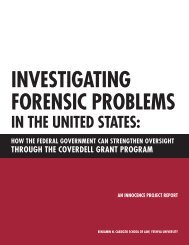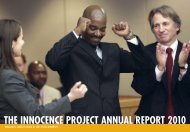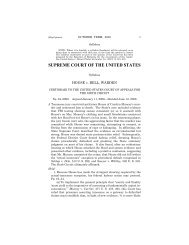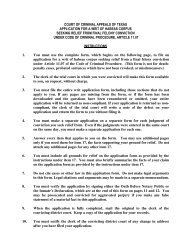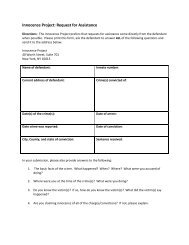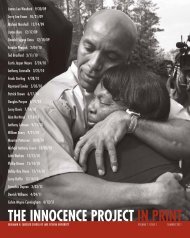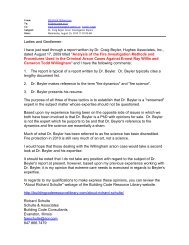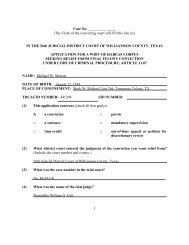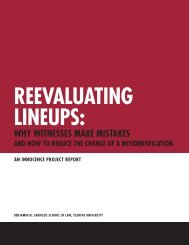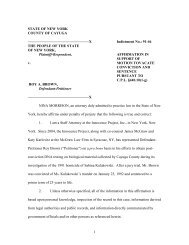Lessons Not Learned - The Innocence Project
Lessons Not Learned - The Innocence Project
Lessons Not Learned - The Innocence Project
Create successful ePaper yourself
Turn your PDF publications into a flip-book with our unique Google optimized e-Paper software.
wholly unsupported by anything police had unearthed, that the victim’s sister was covering for<br />
someone. 12 Finally, he searched the crime scene and located a key, which he thought might<br />
belong to Correa, but which, in truth had absolutely nothing to do with the crime. 13 <strong>The</strong>se<br />
actions and ones like them might well have prompted open-minded investigators to conclude that<br />
Deskovic merely was an inept (but innocent) amateur detective, but the Peekskill detectives had<br />
already become convinced of his guilt.<br />
Tunnel vision continued to operate. As the police became increasingly convinced of<br />
Deskovic’s culpability, the tactics they employed against him made him appear more guilty in<br />
their eyes. At times, they were highly confrontational, accusing him of the crime and sharply<br />
rejecting his professions of innocence. 14 On other occasions, they were collegial, seemingly<br />
inviting this teenager to play a critical role in their investigation. 15 <strong>The</strong>se tactics, themselves the<br />
product of the narrowing police focus on Deskovic, laid the groundwork for a false confession. 16<br />
Ultimately, detectives drove Deskovic to another town and interrogated him in a 10x 10 room<br />
for hours against the pressure-filled backdrop of a polygraph test. <strong>The</strong>y proceeded as they<br />
did because, by then, they were fully convinced of Deskovic’s guilt. That their target was a<br />
psychologically vulnerable sixteen-year-old boy, who had no previous experience with the<br />
justice system, was of no moment under these circumstances. On the day of the polygraph, they<br />
acted for the avowed purpose of getting a confession. 17 <strong>The</strong> tactics they employed were designed<br />
for this purpose and, although those tactics were left largely unexamined by the finders of fact<br />
because the interrogation was unrecorded, they succeeded.<br />
Tr. at 1014.<br />
Once Deskovic was arrested, tunnel vision also distorted the prosecution’s behavior.<br />
12 See Testimony of Det. Levine, Trial Tr. at 834.<br />
13 See Testimony of Det. McIntyre, Trial Tr. at 1175, 11247.<br />
14 See Complaint Follow-up Report of Det. McIntyre (acknowledging that he questioned<br />
Deskovic’s account during their first conversation and requested he take polygraph);<br />
Testimony of Det. McIntyre, Trial Tr. at 1159-60 (same); Testimony of Det. David Levine, Trial<br />
Tr. at 710, 815, 849, 852 (told Deskovic that he was a suspect during questioning on January 9 th<br />
and accused him of committing the crime during interrogation on January 10 th ).<br />
15 See Testimony of Inv. Stephens, Trial Tr. at 163 (Deskovic told Stephens that he<br />
was taking the polygraph on January 25 th because police would permit him to participate in their<br />
investigation if he passed).<br />
16 Findley & Scott at 333-40 Saul M. Kassin, “On the Psychology of Confessions:<br />
Does <strong>Innocence</strong> Put Innocents at Risk?,” 2005 American Psychologist 215, 219-22 (April 2005)<br />
(hereinafter cited as “Kassin”)<br />
17 See Testimony of Inv. Stephens, Trial Tr. at 1034 (acknowledging that goal of<br />
polygraph procedure was to elicit confession).<br />
RePoRT on ConVICTIon oF JeFFReY DesKoVIC<br />
91


